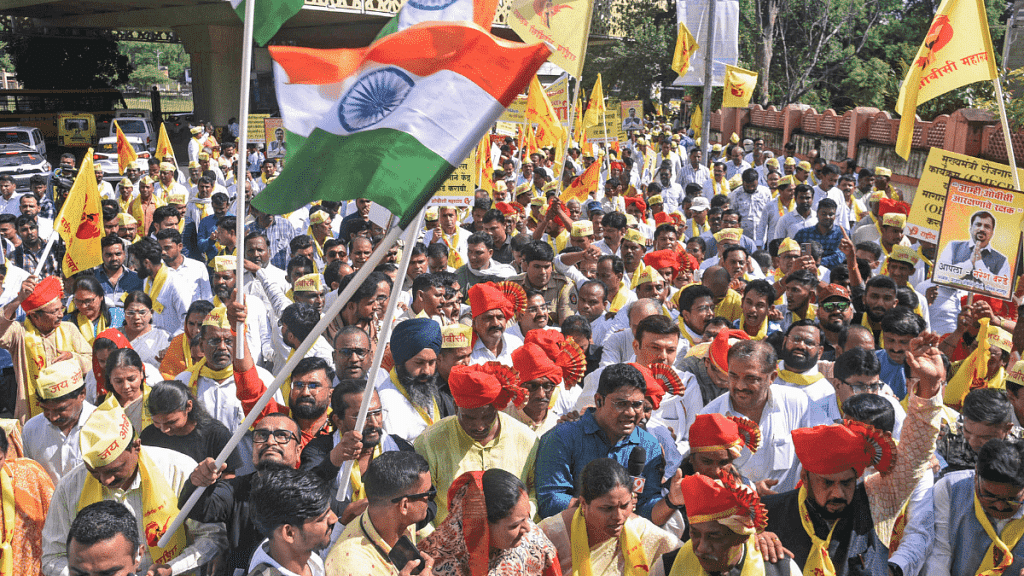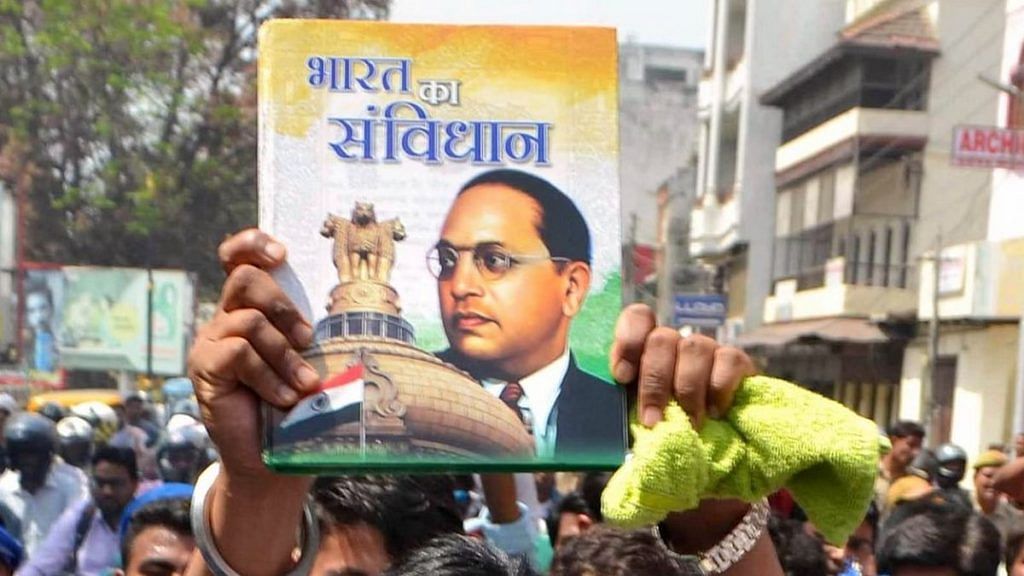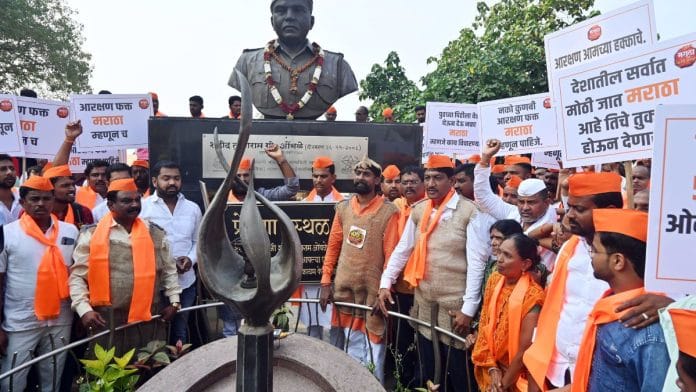India’s reservation policy has been going through a critical paradigm shift, symbolised by the ongoing activism surrounding Maratha reservation in Maharashtra. Unable to gain momentum for a separate reservation and unhappy about the economically weaker section quota in the new legal-political environment, the Maratha community has introduced a novel strategy: claiming a share within the OBC reservation. The desperation for reservation is so intense that activists advocate merging the long-cherished Maratha brand identity with that of the Kunbi OBC community. Historically, Marathas most likely disowned the Kunbi identity due to its purely agricultural nature, which conflicted with their warrior identity and the elevated status assigned to it by the Varna system.
It appears obvious that the Maratha demand for reservation is not about any form of social injustice. Instead, it is deeply rooted in the economic determinism that has dominated post-Independence Maratha politics. Fuelled by the triumphs of the green revolution, mainly in southwestern Maharashtra, the historical warrior community gradually established itself as a distinct Maratha brand, valuing conventional social rank, land ownership, and political heroism. With Marathas overrepresented in Maharashtra’s politics, policymaking has leaned towards self-interest, even as it is portrayed as an earnest pursuit for collective welfare.
The changing landscape of Indian polity has never shattered this status quo and the political representation has statistically remained firm, although divided within different alliances. However, the political alliances have weakened the traditionally concentrated Maratha political power, making it more symbolic than substantial. With the decline of cooperatives largely attributed to corruption and mismanagement, coupled with the dynamic political animosity of shifting alliances, the Marathas’ political handicap has been noticeable in the last few years. Now, the collective realisation of damage to the Maratha brand has transformed into a new form of activism. The drive for homogenisation with the Kunbi sub-caste indicates a crisis that’s larger than the portrayed struggle for opportunities within higher education and government jobs.

The historical identity crisis of the Maratha brand has been evolving rapidly, leading to complex strategies with political nuances. Nevertheless, the new demand for reservation in OBC quota has triggered a new dynamic across the country. Maratha activists are now labelling the community’s exclusion from reservation as a policy error. The statewide drive to establish a unified administrative understanding that Marathas are Kunbis through caste certificate records reflects how the demand for reservation has become a matter of bureaucratic negotiations.
This demand for reservations to benefit a comparatively socially and economically privileged community prompts a revisit to the very bedrock of reservation policies—social justice. It begs a critical question: are reservations meant for ‘policy-hoarding’ by privileged communities?
Further, the Maratha reservation demand has multi-pronged implications for the broader spectrum of social justice in the country, raising concerns not just for OBCs but also Dalits and Tribals. The fracturing of the social justice paradigm of reservation policies signals a survival crisis for India’s Scheduled Castes, Scheduled Tribes, and Denotified-Nomadic Tribes in the long run. Reservations were intended to redress historical discrimination, but they are now being treated as bargaining tools for social and economic benefits. This shift could seriously undermine constitutional values.
Also Read: Maratha reservation protest isn’t just about quota. It will end dynasties
The emerging political economy
The transformative reforms of the 1990s marked a turning point in Indian economy and politics. The demand for educated and skilled workers for the emerging corporate sector prompted strategic policy changes. Coupled with the reservations for OBCs through the Mandal Commission, the path for educational and subsequent labour-force participation became the road to survival. The rapid urban transformation, and the rise of a manufacturing and service sector-focused economy accelerated cultural transformations.
It appeared that the OBCs’ self-determination, driven by the decline of traditional livelihoods, was pragmatic enough to ally well with the market forces. Dalit communities, however, had a generational deficit on the educational and economic fronts. Policy-based reservations alone proved insufficient in the face of persistent social and institutional discrimination. The deadlock for Dalit castes is still intense, and achieving a comprehensive lived experience of social justice is taking more time for them, even as first-generation educated members of the community demonstrate remarkable potential.

Meanwhile, examining the parallel scenes for privileged communities reveals a shift in the economy’s incentive structure, affecting the privileged rural land-owning communities that heavily relied on the cheap labour of OBC, SC, and ST communities.
For these complex social, economic, and political changes, reservations are seen as instrumental by all castes. The privileged castes villainised reservations for affecting their access to the services of underprivileged castes. The marginalised communities viewed reservation as a tool for fruitful participation in emerging market systems. Amid such caste dynamics, reservation is objectified as a central target. As a result, the activism of privileged communities revolves around gaining access to reservation. However, this pursuit has resulted in the fracturing of social justice.
Fracturing of social justice principles
The reservation policy in India was established as a powerful tool to correct historical injustices suffered by underprivileged communities, particularly Dalits and Tribals, who were victims of oppressive caste-based societal structures. Extending the power of social justice, the Mandal Commission’s implementation of OBC reservation was a response to the deteriorating situations of these castes. Consequently, the advancement in social justice achieved by the SC and ST groups also benefited OBC communities through policy-based reservations.
Disenfranchised from the benefits of the green revolution and adversely affected by industrialisation, OBCs could benefit to some extent from the reservation policy. Clearly, these policies actively pursued the social justice principle in India, bridging long-standing socio-economic gaps through opportunities for employment, education, and mobility. Thus, the ethical policy stature of reservation was consolidated in India, but not for long!
Along the way, traditional caste-based discrimination evolved and found expression in urban anti-reservation movements (such as Youth for Equality). Such groups rallied privileged urban youth by using nationalist ideas and actively propagating negative stereotypes about constitutionally rooted social justice measures. The emergence of such movements started changing the reservation policy discourse in India, including in the media.
But ironically, after sustained efforts at defaming quotas and their recipients, the privileged castes have started demanding reservation for themselves. The defining feature of this activism, as seen in the Maratha demand now and EWS quota earlier, is its diversion of focus from historical injustices and societal exclusion. Rather, reservation is portrayed as a negotiable bureaucratic phenomenon involving economic calculations, leaving the core principle of social justice nowhere in the equation.
Nepotism, policy-hoarding, diminished social justice
India’s upper castes have long relied on two powerful tools to maintain their grip on privilege and power: nepotism and policy hoarding. The latter involves strategically amassing policies and schemes, and is often characterised by an overemphasis on bureaucratic procedural complexity. This unethical phenomenon pervades almost all domains, including property ownership, cooperatives, schools, and all possible corridors of power. Nepotistic behaviours and policy-hoarding serve as tactical instruments to sustain the structural advantage.
The constitutional means of reservation was a way to tackle the barring of underprivileged castes from power structures. However, the evil nexus of social and economic privilege continues to determine political mobility, offering avenues for policy-hoarding practices that reinforce the status quo. When checks and balances within the constitutional democratic polity limit the desired gains, privileged communities resort to activism as a strategy for policy-hoarding.
As India’s economy became more market-oriented, the traditional model of nepotistic policy hoarding started to fall apart, and more generic lobbying models emerged. Because of the productivity-driven characteristics of the market economy, labour-inclusive policies became imperative. It proved that the nepotistic policy-hoarding model is inadequate to meet the needs of a fast-changing economic environment.
Within this changing economic pattern, rural Marathas failed to diversify their livelihood systems, mainly due to their strong connection to land and farming, and a sense of pride in their historical privileges. The collapse of cooperative institutions and widespread corruption caused added stress.
Over time, nepotistic practices have failed to deliver adequate policy gains, leading to a loss of economic potential in community-centric institutions, particularly cooperatives.
Historically, nepotistic practices posed an active threat to the integrity and efficacy of reservation policies. And now the same mindset has objectified reservation as an incentive rather than an ethical tool. The limitations of the privileged class’ economic determinism, coupled with frustration from uncontrollable emerging economic structures, have resulted in more complex dynamics of reservation, distancing it from its original social justice intent to an arena of nepotistic, clannish politics.
Also Read: Untouchability to social jealousy—Understanding 21st century Dalit in the emerging scholarship
Evolving challenges for Dalits
The continued evolution of the reservation discourse, particularly in the backdrop of Maratha protests for OBC quota and the upper caste demand for economic criteria-based reservation (EWS), calls for a critical reevaluation of India’s social justice paradigm.
It is evident that reserved category students and teachers encounter substantial barriers within academic institutions, and that caste-based discrimination has become a problem in the corporate world globally. In this challenging environment, Dalits have an existential obligation to protect their only policy safeguard—the reservation system. However, its systematic threat of misuse by dominant groups, rooting it out from its original paradigm of social justice, has posed new challenges. Now, Dalit scholars, activists, and political groups confront a difficult road ahead.
Reclaiming reservation as a policy aimed at social justice is an essential step. For this, politically motivated narratives on reservations for economic gains have to be dismantled. The erasure of the crucial historical context of untouchability from the reservation discourse should be recognised as an evolved form of casteism.
As for the policymakers in India, it is time for more innovative and targeted policymaking for the welfare of poor communities and households, including Marathas from underdeveloped regions such as Marathwada and Vidarbha in Maharashtra. It is unethical to stretch the constitutionality behind reservations beyond the moral boundaries of the social justice framework.
Dr Govind Dhaske is a social scientist. He tweets @GlobalGovind. Sagar Kamble is a research scholar in political theory. Views are personal.
(Edited by Asavari Singh)







THIS RESERVATION POLICY WAS INTRODUCED AFTER INDEPENDENCE ON THE ASSUMPTION TO FACILITATE THE UNPRIVELGED TO THE MAINSTREAM OF THE SOCIETY FOR A LIMITED PERIOD ONLY BUT CONTINUED TILL DATE DUE TO VOTE BANK POLITICS.THE MERITORIOUS PEOPLE EITHER SERVE IN PRIVATE COMPANIES OR GO ABROAD FOR BETTER PROSPECTS,LEAVING THE REST MOSTLY IN GOVT SERVICE,RESULTING IN MEDIOCRE SERVICE IN GENERAL.THIS IS TOTALLY UNJUSTIFIED TO REST OF THE POPULATION BUT WHO CARES ABOUT PEOPLE’S CRY IN THE WILDERNESS?!
Very good article & excellent presentation.
But why should the SCs & STs have any issues, if their quotas are not affected ? It is not a healthy sign of one caste group objecting to another caste group – it’s up to the policy makers of the day, addressing contemporary concerns – so well espoused in this very article.
Meanwhile, it’s fair to say that the quota for native Kunbis should be protected, while onboarding Marathas, in proportion to the former’s numbers.